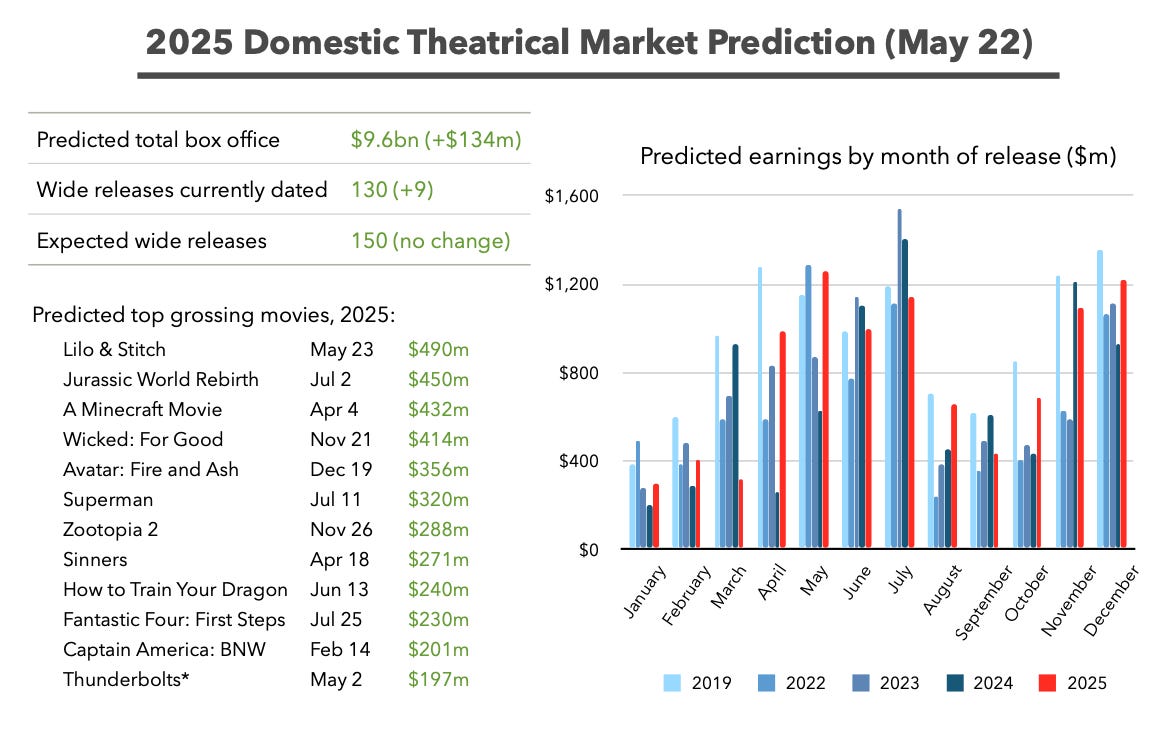The State of Theaters, the Decline of Cable, and Piracy
Today is part two of my “Four Horsemen of the Media-pocalypse” check-in, which I started last week with a big ‘ol article on AI. Frankly, there’s just way, way (probably throw in another “way”) way too much to talk about...
And I have more thoughts on AI than I know what to do with, which is why I wrote a very long take on it last week, in addition to my update on how I’m using AI.
So that’s the plan today, re-hitting these very important topics. This article is a bit more of a “link drop/news round-up” than my usual writing, but these issues merit deep dives outside of my usual strategy column.
If you follow the US box office numbers (and I do), you might have found the roller coaster ride of the US box office a bit disconcerting. The year opened up terribly, with one horrible month after another, followed by surprise hits in Minecraftand Sinners (not a surprise to me, but thanks Warner Bros. for propping up the US box office), and now, the box office is better...ish. June was down, but July looks big.
My favorite predictor of box office performance comes from The-Numbers. Here’s their latest forecast:
They’re predicting $9.6 billion for the year. (I definitely recommend signing up for their monthly newsletter!)
Still not the heights of 2017-2019, the three-year barometer of box office in the US, but a nice rebound. All that said, ticket sales still appear to be flat, meaning the total box office dollars are driven by ticket price increases, not more customers attending more often.
So those are the results, let’s quickly run down some updates on all the factors still holding theaters back...
In terms of fixing the experience, I love that Connecticut wants movie theaters to accurately display film start times; I love trailers, but do we need more than three and one ad? Seriously, it can take thirty minutes for a movie to start, and that’s just way too long.
I also love the idea of non-profits running theaters in small towns. And the rebirth of repertory and revival cinemas. And movie theaters expanding their offerings of what the theater space can be used for. Clearly, people love going to the movies and/or love theater spaces.
Finally, I’d be remiss if I didn't shout out the great work that Ted Hope, Sophie from That Final Scene, and Alex Rollins-Berg have been doing to highlight local cinemas and re-envision the space.
Last fall, when ESPN+ had its exclusive NFL game, some old men I know were complaining that they didn’t want to pay for it, so another 60-year-old man gave them instructions on how to steal it.
When 60 and 70-year-olds know how to pirate content, everyone does.
Many, if not most, analysts under-rate how much piracy enabled cord-cutting or customer cost-cutting over the last decade. Sure, in the 2010s, Netflix didn’t cost very much, and most people already had Prime (since you can’t pirate next-day shopping), but if you wanted to watch NFL or NBA games, you had to find an illegal live stream.
The same goes for the rise of social/user-generated video. A not insignificant amount of social video/user-generated content repurposes popular films, TV shows and video games. Much of that usage is legitimate; much of it isn’t. I think many pundits discount how, if Google had to pay royalties at the rate they should for pirated material on YouTube, YouTube’s growth would have stalled out.
So will we solve this problem in 2025? Probably not. Earlier this year, Congress introduced H.R. 791, the Foreign Anti-Digital Piracy Act, but I haven’t heard or seen any updates. In Spain, this year, La Liga has been able to use similar measures to cut piracy down by 60%.
The other big news this year was that two films were pulled from Sundance’s digital streaming service, after scenes (especially sex scenes) leaked online. Apparently, Sundance had set up an “online festival” during the pandemic, so folks could buy tickets to watch the movies digitally, and some people then pirated the films.
This goes to something that’s bugged me since the 2000s: what sort of a-hole is stealing, literally stealing, from starving artists like indie filmmakers?
Speaking of piracy, let’s talk about AI/LLM and piracy. As I wrote last week, when folks criticize AI, they are either skeptical of its competency or they’re worried about the ethics of AI. The piracy issue falls into the AI-and-ethics bucket.
First off, here’s how much traffic news websites have lost to LLMs:












